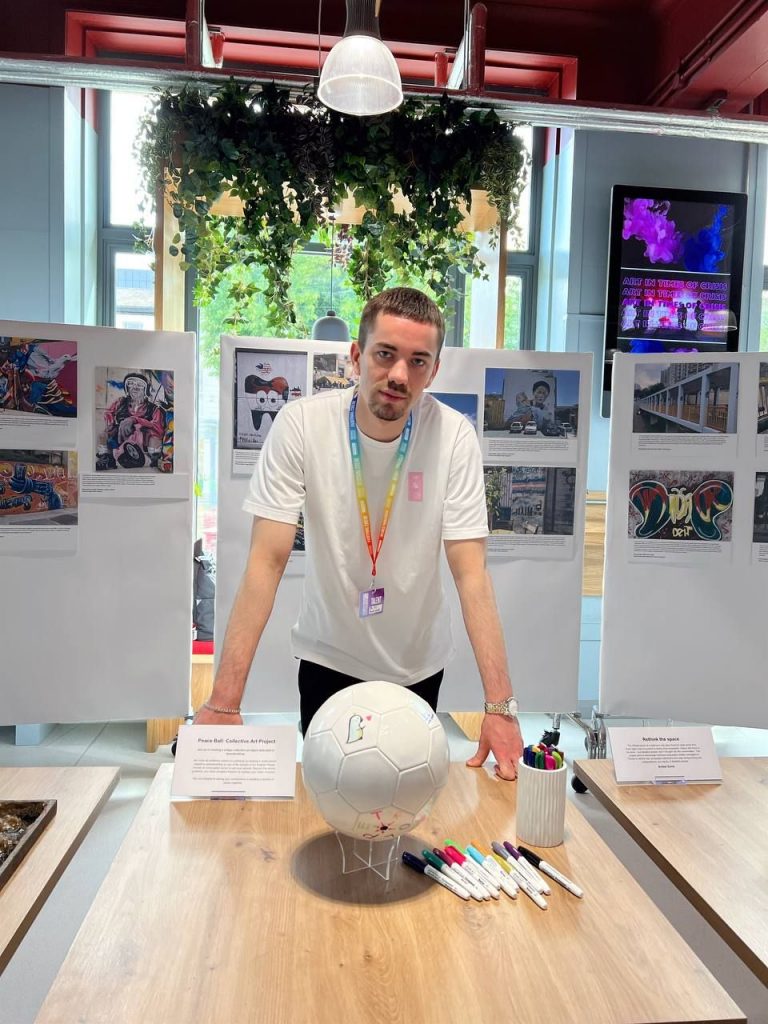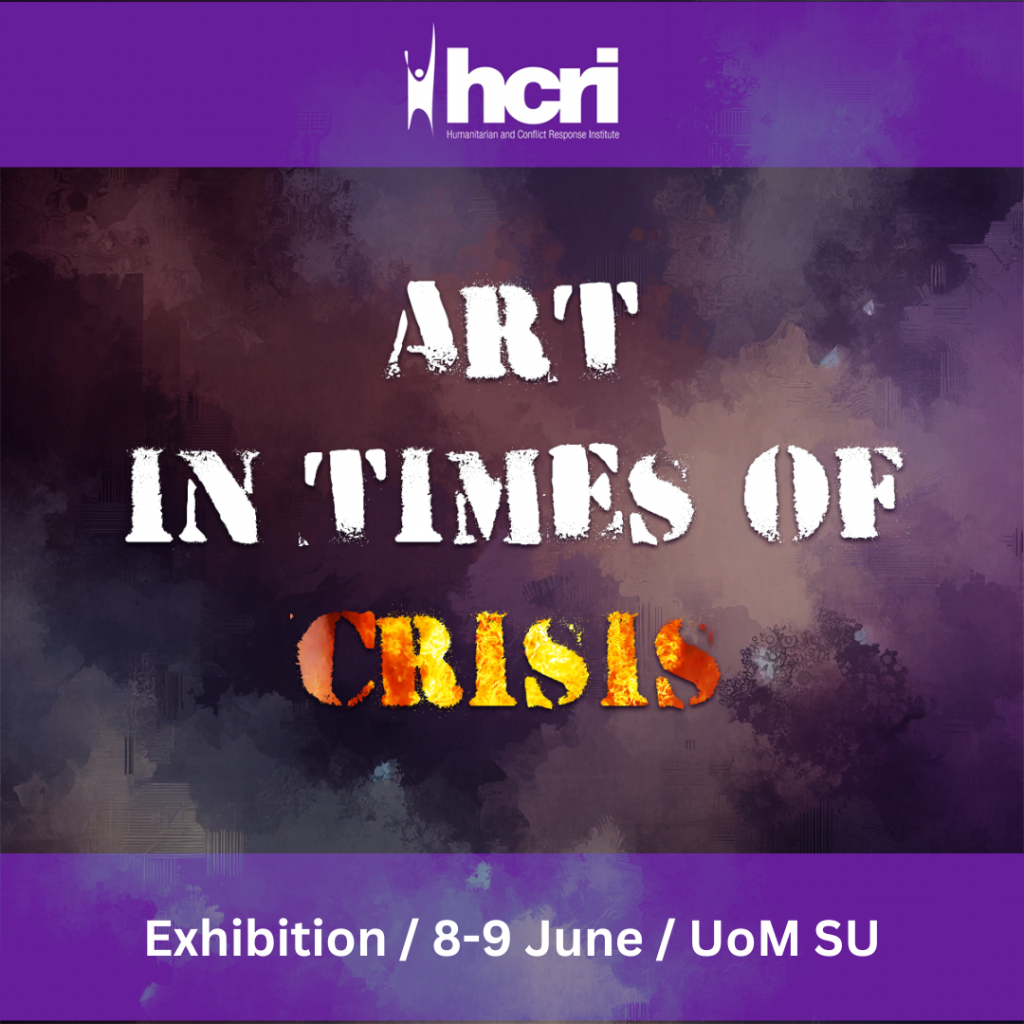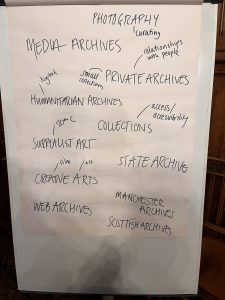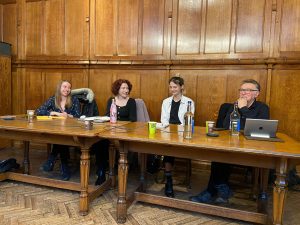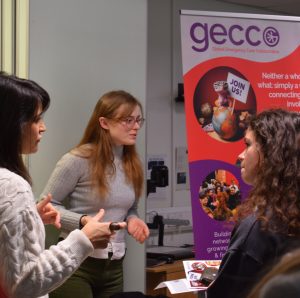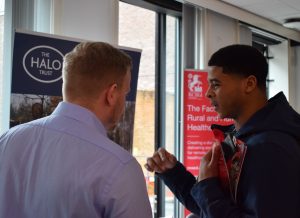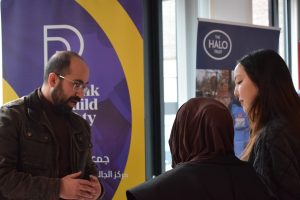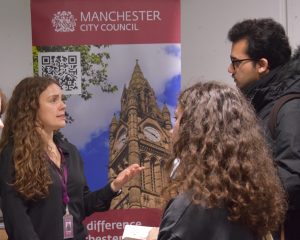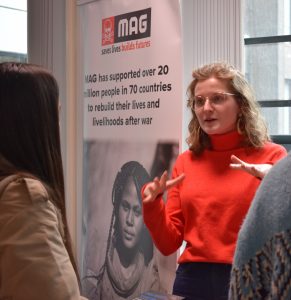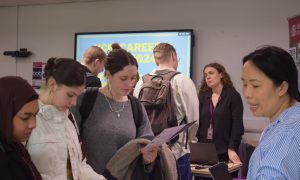Our latest events…
Art in Times of Crisis, Exhibition at Universally Manchester, June 2024
On 8th / 9th June, HCRI staff and students displayed multimedia artwork at an exhibition during Universally Manchester, the university’s 200 year anniversary festival – here
The exhibition – Art in Times of Crisis – showcased work inspired by HCRI’s research on challenging global issues. Displays included photography from Dr Birte Vogel’s work on the intersection of graffiti, art and peace studies, and multimedia content from Dr Stephanie Sodero and her students on challenges of and responses to climate change.
The exhibit was curated by a former HCRI student – Dmitrii Andrianov – who graduated with an MSc in International Disaster Management and Humanitarian Response in 2023.
Attempting to Kill the Law of Peace, with Prof Mary Ellen O’Connell (11th April 2024)
On 11th April 2024, HCRI and UoM Law School hosted Prof Mary Ellen O’Connell (profile here).
The almost unimaginable loss and devastation of World War II led to the boldest initiative in history to outlaw armed conflict. It began with codification of the ancient moral and legal prohibition on resort to major military force combined with an institution to enforce the prohibition and to deal with the causes of conflict in the United Nations Charter. The Charter also mandates the use of peaceful means for the settlement of disputes. The entire effort was aimed at “saving succeeding generations from the scourge of war …” It has failed.
This talk investigated why. It exposed the ideological opposition to laws and institutions devoted to peace. This talk offered a radically renewed way of thinking for future generations committed to peace and the flourishing of the natural world.
Workshop: The Multiple Transformations of the Archives, 1920s to 2010s (13th – 14th March 2024)
HCRI researchers organised and spoke at a two day workshop, held at the John Rylands Research Institute and Library, which brought together PhD and Early Career Researchers in both history and social sciences to engage in meaningful discussions on the ways in which archives have been constructed, maintained, and transformed in the 20th century. Themes included ‘Archival power structures’, ‘ Humanitarianism, migration studies and the archive’, and ‘Archives and the digital era’.
The organisers were: Niamh Hanrahan (PhD Candidate, HCRI), Panagiotis Karagkounis (PhD Candidate, HCRI) and Flora Chatt (HCRI).
Humanitarian Extractivism: The digital transformation of aid, 7th March 2024
For this HCRI public event, we were joined by Kristin Bergtora Sandvik, Research Professor in Humanitarian Studies at Peace Research Institute Oslo and Professor of Sociology of Law at the University of Oslo.
Drawing on her new book, the talk investigated the digital transformation of aid as a form of ‘humanitarian extractivism’. It focused on how practices of data extraction shift power towards states, the private sector, and humanitarians. The talk explored new humanitarian spaces and practices, such as the humanitarian drone airspace, wearable innovation challenges, and ethics in global disaster innovation labs.
Careers in Humanitarianism Fair, 28th February 2024
HCRI hosted a ‘Careers Fair’ event, to facilitate interaction between our students and a range of humanitarian and human rights organisations, as well as the UoM Careers Service and Manchester City Council Jobs Team.
Thank you to the many organisations that took part and shared insights and opportunities with HCRI students.
Careers in Humanitarianism Panel, 14th February 2024
HCRI hosted a panel event for University of Manchester students interested in working in the humanitarian and human rights fields.
We had four speakers, with plenty of Q&A / discussion. Speakers were asked to brief us on their organisations, reflect on their own career path, and pass on any lessons they may have to students about work and life in this sector. The original event blurb is at: https://careers-panel-hcri.eventbrite.co.uk/
Below is a video of one speaker, Kerry Brighouse, who is the UK Programme Director at Hope for Justice, a global NGO challenging human trafficking and modern slavery, headquartered in Manchester.
HCRI Landmark Lecture 2023 – Southern European countries and international aid (1945 – 1990), 7th December 2023 at University of Manchester
Our guest speaker was Silvia Salvatici, Professor of Modern History at the University of Florence. Her recent research interests focus on refugees in the contemporary age and the history of humanitarianism. She is Principal Investigator of the projects ‘Republican Italy and international aid, 1945-1989’ (funded by the Italian Ministry of Education, University and Research) and ‘HumanEuroMed. Humanitarianism and Mediterranean Europe: A Transnational and Comparative History, 1945-1990’ (funded by the European Research Council).
This presentation offers some examples of the humanitarian undertakings of Southern European countries looking at the experience of different actors such as institutions, administrators, experts, non-governmental organisations. Specific attention is devoted to the entangled histories of international aid and decolonization from the point of view of the so-called ‘(former) minor colonial powers’ (Portugal, Spain and Italy) but also of countries, like Greece and Yugoslavia, that had never had colonial possessions. Furthermore, the lecture looks at the role that humanitarianism has played in the relationships between Southern European countries, challenging the common approach to international aid as a North-South relationship.
Disasters, risks and politics in the age of climate change, 24th November 2023
The Politics and Everyday Practice of International Humanitarianism, 12th October 2023
In our first public event of 23/24, Dr Miriam Bradley discussed her 2023 book The Politics and Everyday Practice of International Humanitarianism (purchase the book). The discussant was Bertrand Taithe, Professor of Cultural History at HCRI. The audience Q&A section has been removed from the video.
Global Manchester network event, 2nd October 2023
Representatives from HCRI attended the ‘Global Manchester’ reception at HOME, which highlighted the work of 7 Manchester-based humanitarian organisations who collectively achieve major global impact.
The hosts, Mines Advisory Group, estimate that charities and NGOs headquartered in Manchester benefited the lives of over 7 million people in 58 countries last year.
The keynote address was given by Sir Graham Brady (MP for Altrincham and Sale West), who noted the diversity and outsized impact of international organisations based in our city and region.
A video was shown introducing the 7 network members and their work (below).

